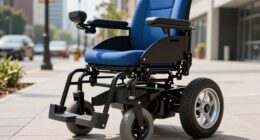While browsing the hearing aid forums, I learned a lot about the challenges many face in finding affordable options. I discovered that hearing aids can cost upwards of $6,000, which is shocking for most. I also found popular models like Kirkland and Audicus recommended by users. Many emphasized the importance of consulting a qualified audiologist over lesser-trained specialists for better results. The forums highlighted gaps in consumer education about hearing aids and shared tips to help with decision-making. There's so much more insight to uncover about your options and how to approach purchasing them, so let's explore this further together.
Key Takeaways
- Many users report high costs as a significant barrier to obtaining hearing aids, with alternatives available at retailers like Costco and Audicus.
- Popular models discussed include Kirkland hearing aids, which are often praised for their affordability and performance.
- Professional care is highlighted as crucial, with users emphasizing the importance of ongoing assessments from audiologists.
- Community forums provide valuable tips and shared experiences that aid in making informed purchasing decisions.
- There is a notable gap in consumer education, leading to confusion about the quality and features of different hearing aids.
Hearing Aid Costs Overview
When it comes to hearing aid costs, many of us are shocked to find that the average price for a pair can hover around $2,500, and in some cases, it can exceed $6,000.
I can't believe how many people I've talked to who feel overwhelmed by these prices. It turns out that about 80% of hard of hearing Americans think hearing aids are too expensive, which is frustrating.
I've learned that a few companies dominate the market, often marking up prices by 70%. Thankfully, there are more affordable options available.
For instance, Costco offers hearing aids at about half the traditional price, and online retailers like Audicus provide even lower-cost alternatives.
It's essential to seek out these options, especially considering that certain brands offer innovative features that can enhance the overall hearing experience.
Community Insights and Experiences

Sharing experiences in hearing aid forums can be incredibly enlightening, as users exchange valuable insights and recommendations.
I've found that these discussions often highlight specific models that truly work well, like the Kirkland hearing aids and Audicus options, which many users rave about for their clarity in conversations.
Personal stories emphasize the importance of finding the right professional care, as the quality of audiologists can greatly affect satisfaction.
I've noticed that peers frequently share tips that lead to better purchasing decisions, revealing gaps in consumer education about hearing aids.
Audiologists vs. Hearing Instrument Specialists

The distinction between audiologists and hearing instrument specialists (HIS) can greatly impact your hearing aid experience.
I've learned that understanding these roles is vital for making informed decisions. Here's what you should know:
- Education: Audiologists require advanced degrees and extensive training, while HIS can be licensed after just a few months of training.
- Quality of Care: The skill set of the provider often matters more than their credentials, so personal experience is key.
- Ongoing Support: Audiologists typically provide regular assessments and adjustments, essential for effective hearing aid use. Additionally, they can help identify underlying conditions such as otosclerosis and hearing loss, which may require specialized treatment.
Navigating between these options can be tricky, but prioritizing professional care and understanding their differences will enhance your hearing health journey considerably.
Challenges in the Hearing Aid Industry

Steering through the challenges in the hearing aid industry can feel overwhelming, especially with so much misinformation and high costs. Many people, including myself, find it tough to navigate the financial burden of hearing aids, often exceeding $6,000. The industry seems monopolized, with only a few companies controlling prices, and audiologists acting as middlemen.
| Challenge | Impact |
|---|---|
| High Costs | 80% of hard-of-hearing Americans find aids too expensive |
| Misinformation | Consumers struggle with understanding product quality |
| Limited Accessibility | Many seniors lack affordable options |
| Quality Concerns | Confusion around audiologist versus HIS care |
These factors make it essential for us to demand transparency and advocate for fair pricing in the hearing aid market.
Consumer Education and Awareness

Many consumers feel overwhelmed by the complexities of choosing the right hearing aids, often leaving them misinformed and frustrated.
Through my exploration of hearing aid forums, I've discovered that education is vital for making informed choices. Here are three key points to take into account:
- Understand Costs: Familiarize yourself with typical prices and explore various options, including online retailers and warehouse clubs.
- Seek Community Insights: Engage with others who've shared their experiences; their feedback can guide your decisions.
- Consult Professionals: Don't hesitate to ask questions and seek advice from audiologists or hearing specialists to guarantee you're making the best choice for your needs.
Staying informed can empower you to navigate this challenging landscape with confidence.
Product Effectiveness and Recommendations

When diving into the world of hearing aids, understanding product effectiveness is important for making the right choice.
I've found that low-cost hearing aids often amplify sound but lack the natural listening experience. Quality models utilize advanced technology, which can greatly improve clarity and comfort.
It's essential to consult professionals to guarantee the aids are tailored to your specific needs. I've read varied user experiences with different types, like BTE versus ITE. Many recommend trying in-the-canal aids for better comfort.
Don't forget that fitting and adjustment periods are critical for peak performance. Before you purchase, research specific brands and deals through forums; they've been a treasure trove of insights that can guide your decision-making process.
Accessibility of Hearing Aids

Accessibility to hearing aids remains a significant barrier for many individuals, particularly for those on fixed incomes.
I've seen firsthand how overwhelming the costs can be, with many seniors feeling financially strained.
Here are a few key issues I've noticed:
- High Prices: Many people find the average cost of hearing aids, around $2500 for a pair, simply unaffordable.
- Limited Insurance Coverage: Insurance often doesn't cover hearing aids, leaving many in a tough spot.
- Market Monopoly: A few companies dominate the market, leading to inflated prices that make hearing aids inaccessible for many.
It's clear we need more affordable options and better support for those who struggle with these costs.
Peer Support and Advice

Finding affordable hearing aids can be a challenging task, but peer support and advice can make a real difference.
Through my time in hearing aid forums, I’ve discovered that connecting with others facing similar challenges provides invaluable insights. Users share their experiences with various models, helping me navigate the overwhelming options. Additionally, some community members have recommended resources like the insight timer meditation app details, which help manage the stress and anxiety that can come with hearing difficulties. By incorporating these tools, I’ve found a more balanced approach to my hearing journey, blending technical understanding with emotional support.
I've learned about budget-friendly alternatives like the Kirkland Signature aids and discount retailers that offer quality devices without breaking the bank. Hearing personal stories boosts my confidence in making informed choices.
Plus, the community fosters discussions about the importance of professional care and fitting adjustments. Gathering advice from those who've been in my shoes has truly empowered me in my hearing journey, transforming what once felt intimidating into a manageable experience.
Frequently Asked Questions
What Are the Latest Advancements in Hearing Aid Technology?
I've found that the latest advancements in hearing aid technology include improved sound processing, better battery life, and connectivity features. These innovations enhance user experience, making conversations clearer and more enjoyable than ever before.
How Can I Clean and Maintain My Hearing Aids?
"An ounce of prevention is worth a pound of cure." To clean and maintain my hearing aids, I gently wipe them daily with a soft cloth, avoid moisture, and schedule regular check-ups with my audiologist for ideal performance.
Are There Any Government Programs Assisting With Hearing Aid Costs?
I've found that government programs like Medicaid and Medicare can offer assistance for hearing aid costs. Additionally, some states have specific programs to help seniors. It's worth checking local resources for more options.
What Should I Consider When Choosing Between BTE and ITE Hearing Aids?
Choosing between BTE and ITE hearing aids feels like picking a key for a lock—fit matters. I'd consider comfort, discretion, and my lifestyle. Trying both styles helped me find what truly works for my hearing needs.
How Do I Know if My Hearing Aids Need Adjustment?
I know my hearing aids need adjustment when sounds feel muffled, conversations become challenging, or I notice discomfort. Regularly checking with my audiologist helps guarantee my aids function effectively for my needs.
Conclusion
As I wrapped up my exploration of hearing aid forums, I couldn't help but notice a coincidental connection among us all—our shared desire for better hearing and understanding. Each story, each tip exchanged, reinforced the idea that we're not alone in this journey. Armed with knowledge and support from this vibrant community, I feel empowered to navigate the hearing aid landscape with confidence. Together, we can face the challenges and celebrate the victories, one hearing aid at a time.









